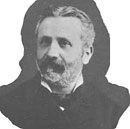Sigmund Freud And... |
Hippolythe Bernheim
 During the summer of 1889, seeking to improve his technique and knowledge in the
field of hypnosis, Freud made a few weeks' stay in the service of Bernheim, in Nancy. This voyage will mark a significant point in the evolution of Freudian thinking, making it possible for Freud to take a retreat from the
Charcot's design, who considered hypnosis a morbid condition, artificially induced, taking advantage of hysterical subjects' particular organic components.
During the summer of 1889, seeking to improve his technique and knowledge in the
field of hypnosis, Freud made a few weeks' stay in the service of Bernheim, in Nancy. This voyage will mark a significant point in the evolution of Freudian thinking, making it possible for Freud to take a retreat from the
Charcot's design, who considered hypnosis a morbid condition, artificially induced, taking advantage of hysterical subjects' particular organic components.
On the contrary, Bernheim saw hypnotic phenomena as a manifestation of human suggestibility likely to be mobilized in any person. This design opens the way to the concept of
transfer, which was to emerge later. Hippolythe Bernheim's (1840-1919) origin lies in the Mulhouse area, where he made his medical studies. Since the start of the 1870 war, Bernheim had settled in Nancy where
he practiced as an internist. He was intrigued by Doctor Liebeault's reputation, a doctor who worked in the city, who initiated him into hypnosis. Little by little, Bernheim became
the head of the school known as of Nancy, for a long time opposed to prestigious Charcot's group. Bernheim showed a rigor sometimes missing in this debate, and had great influence in the movement about to release the
hypnosis from hysteria and turn it into a phenomenon of suggestion. During the years following his visit to Nancy, Freud translated two significant works by Bernheim into German.
--
Copyright René DesGroseillers
Read also:
|
|
Home | Resources | Forum | Newsletter | Contact Copyright 1999-2024, AROPA. All rights reserved.
![]()